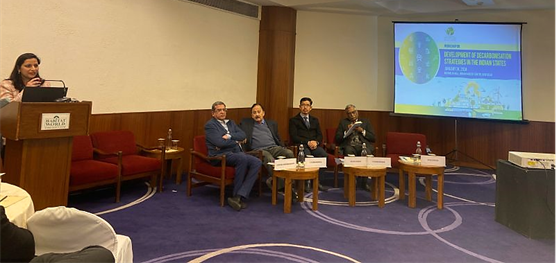Shakti Sustainable Energy Foundation and Vasudha Foundation co-hosted a workshop on ‘Development of Decarbonisation Strategies in the Indian States’ on January 24, 2024, at the India Habitat Centre in New Delhi. The workshop brought together relevant stakeholders from the government, industry, civil society, and other experts to deliberate on various aspects of developing low-carbon strategies and pathways tailored to the specific needs of each state.

The main objective of the workshop was to investigate various options for implementing low-carbon pathways in different Indian states. It provided a platform for discussions aimed at pinpointing the primary challenges and opportunities involved in devising a comprehensive roadmap for the adoption of low-carbon strategies nationwide.
Additionally, the workshop saw the unveiling of two reports:
- An Outlook of India’s Electricity Demand Analysis and Projections for the Next Decade
- Managing Peak Electricity Demand in the Indian Electricity Sector

Commencing with an inaugural address, various dignitaries from the government and subject matter experts emphasised the crucial role of states in addressing climate change issues while contributing to the nation’s economic growth. “States play a significant role in driving climate ambition to action. An economy-wide analysis is essential to align climate planning with the state’s economic growth, ” said Nidhi Madan, Associate Director of Shakti Sustainable Energy Foundation, setting the context for the workshop.
The workshop consisted of two distinct sessions, each focusing on climate change mitigation and adaptation to formulate a robust low-carbon plan for the country:
- ‘Role of Data and Information for Developing Decarbonisation Pathways in India’: This session delved into issues such as data availability and the coherence of various initiatives across interconnected sectors like transport and power. The goal was to build a comprehensive roadmap that considers the unique circumstances of each state while supporting their economic development.
- ‘Role of Adaptation Strategies and Localising Climate Change on Overall Decarbonisation’: This session deliberated on adopting a bottom-up approach for successful initiatives at the national level. It emphasised the importance of localising climate actions based on the specific circumstances and resource availability of each state.
